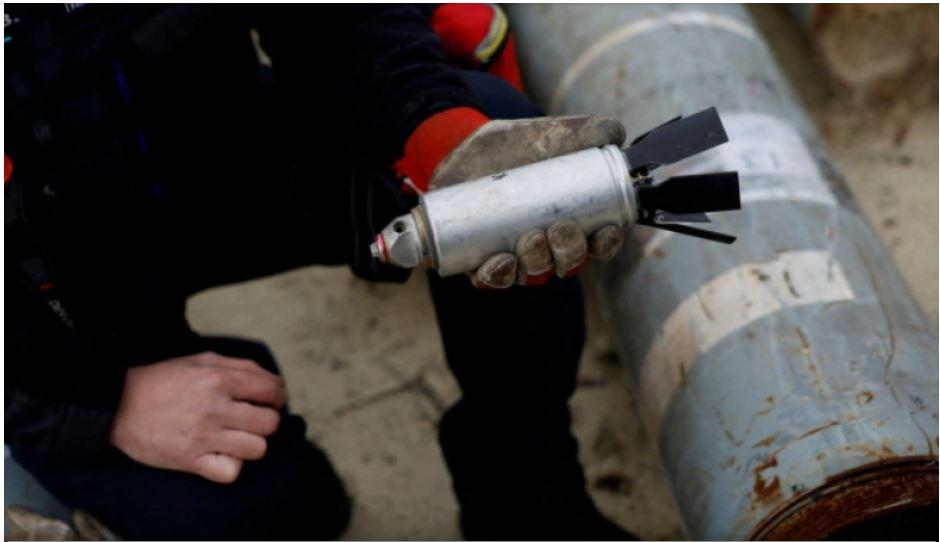US confirms Ukraine is already using its cluster bombs against Russian targets

independent: Ukrainian armed forces are using the cluster bombs provided by the US in their counteroffensive against Russia, the White House has confirmed.
The US provided the war-torn nation with cluster munitions after much debate as part of an $800m security package in its war against Russia, despite opposition from human rights groups.
Cluster munitions are prohibited by more than 100 countries. They typically release large numbers of smaller bomblets that can kill indiscriminately over a wide area.
The bomblets, if they fail to explode on impact, can pose a long-term risk similar to landmines.
Ukraine's forces started using the munitions "in the last week or so", White House national security council spokesperson John Kirby told reporters on Thursday.
"They are using them appropriately, they are using them effectively and they are actually having an impact on Russia's defensive formations and Russia's defensive maneuvering," he said.
Ukraine has said it will use cluster bombs only to "de-occupy" its territory and that it will not use them on Russian territories.
Russia, Ukraine and the US have not signed the Convention on Cluster Munitions, which bans production, stockpiling, use and transfer of the weapons.
The decision to send the munitions to Ukraine has been opposed by Spain and Canada, while Britain said it was part of a convention that discourages use of the weapons.
Russian president Vladimir Putin said on Friday that the West was stoking the “flames of war” by supporting Ukraine and that Western weapons supplied to Ukraine “burn well” on the battlefield.
He last week said Moscow had a "sufficient stockpile" of cluster bombs and reserved the right to use them if such munitions were deployed against his forces.
"I want to note that in the Russian Federation there is a sufficient stockpile of different kinds of cluster bombs," Mr Putin said.
"We have not used them yet. But of course, if they are used against us, we reserve the right to take reciprocal action."
The Russian president said he regarded the use of cluster bombs as a crime and that Russia had so far not needed to use them, despite having suffered its own ammunition issues in the past.
Meanwhile, Russia stepped up its assault on Ukraine’s ports with a third night of air strikes as it claimed to treat all ships heading for those ports as potential military targets.
Saying that Moscow was deliberately turning the Black Sea into a “danger zone”, Kyiv responded in kind by announcing that from Friday, ships heading for Russian ports – or Russian-occupied ports in Ukraine – would be treated in the same way, as if they are carrying weapons or other military cargo.
It follows Moscow’s decision to withdraw earlier this week from a UN-brokered deal to let Ukraine export grain.
 Latest news
Latest news Latest news
Latest newsUkrainian Drones Set Fire to Russia’s Largest Gas Plant, Gas Intake from Kazakhstan Suspended
20.Oct.2025
Trump and Zelensky in Washington: The Return of “Hardline Support” Policy
19.Oct.2025
Activist Margretta Mirzoyan on the Political Mood in Armenia
18.Oct.2025
Trump and Putin Prepare to Meet Ahead of Zelensky’s White House Visit: A New Phase of Diplomacy or Pressure on Kyiv?
17.Oct.2025
A Shadow over the Russian-Azerbaijani Thaw: What Lies Behind the Arrest of Former Presidential Chief of Staff Ramiz Mehdiyev?
16.Oct.2025
Russia and Syria: A New Chapter in Relations After the Coup
16.Oct.2025
NATO and EU Join Forces to Build a “Drone Wall”
15.Oct.2025
Trump: New bonds of friendship to join Armenia to Azerbaijan
14.Oct.2025
UK to lift its arms embargo on Armenia, Azerbaijan
14.Oct.2025
Russia Opens New Criminal Case Against Opposition Figure Khodorkovsky
14.Oct.2025

 24 Oct 2025
24 Oct 2025








